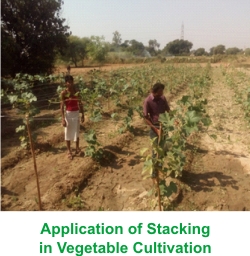|
Building Capacities of
Schedule Caste
Farmers through Agri-Horti Model
About
85 percent of the farmers in India are marginal and small farmers. More
than half of such farmers live in a resource constraint system with
limited land availability and water scarcity and lack access to sources
of energy. The Bundelkhand region in Central India is one such difficult
terrain where farmers face continuous droughts. It is home to a large
number of farmer households who own two to three acres of land. In the
farming community, the condition of Schedule Caste (SC) farmers is worse
due to low land holding, poor agricultural productivity and meagre
access to advanced farm technologies. The SC farmers hardly have an
opportunity to contribute their knowledge, experience and skills when
technologies and development programmes related to agriculture are
formulated centrally and imposed on the people, perpetuating their
dependence on external agencies.
The promotion of Agri-Horti based Livelihood
among Schedule Caste farmers supported by the Department of Science and
Technology, Government of India supports SC farmers to use their farm
land and resources optimally to ensure sustainable livelihoods. The
project provides them with various practices to help them in setting up
profitable agriculture as a livelihood option with integration of
demonstration, skill building and linkages with stakeholders. Some of
these practices are mentioned below:
A. Agri-horticulture system (crop +
fruit): The Agri- Horti model has emerged as a sustainable
agriculture practice where farmers are assured an income even in adverse
climatic conditions. It is based on the sound principle of
diversification using the limited land available to the farmer. The
demonstration of agri- horticulture system provides risk free
opportunity among SC farmers. Around 197 Schedule Caste farmers have
implemented the Agri- Horti Model in the first two years of the project.
B. Use of new technologies for vegetable
cultivation: In order to promote vegetable cultivation, improved and
appropriate technology by integration of different methods has been
demonstrated among the Schedule Caste families to ensure the proper
germination and transplantation of vegetable seedlings and also help in
preparation of quality seedlings for sale. The technologies like
coco-peat, poly mulching, vermi compost tetra beds have emerged as
vibrant practices among the Schedule Caste farmers.
C. Change from traditional practices to
low cost-efficient farm practices: The combination of vegetable,
fruit and fodder cultivation on the same farm has given more enhanced
and sustainable income to this community.
D. Value addition to vegetable produce:
Due to lack of value addition at the farms through sorting and grading,
the SC farmers were not able to get premium price for their produce. At
the same time, the post-harvest losses were very high. The project
intervention has made an attempt to build the capacity of Schedule Caste
farmers to enhance the quality of their products by grading, sorting and
packaging their products from their farms to the market in order to
fetch better price for their products.
Case Study
Karan, a Schedule Caste farmer from village
Sitapur in Datia district in Madhya Pradesh has taken the opportunity to
learn new practices in vegetable cultivation through DST Talim project.
Earlier he was not able to harness the optimum profit through vegetable
production due to lack of advance technologies and knowledge. Through
trainings and exposure visits, he learnt about the practice of Poly
Mulching and Stacking of Vegetable crops. The Poly Mulching has
maintained the due moisture in his plant saplings and Stacking has
prevent the damage in fruits and also enhanced the production. Thus he
was able to harvest high quality of the vegetables and fruits. This has
given him opportunity to negotiate with traders for better price of his
agricultural products.
Conclusion
The project is helping in developing the
marginalised community by involving them in better practices on agri-horticulture
based livelihood through integration of vegetable farming and fodder
production for livestock security to enhance per capita income of the SC
farmers.
■
Shobhit Pratap Singh
ssingh@devalt.org
Back to Contents
|